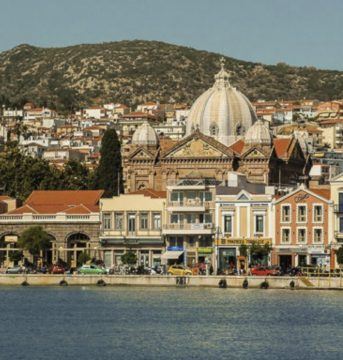Caroline Alexander in The American Scholar:
 The Spercheios river—which, legend tells us, was dear to the warrior Achilles—marks the southern boundary of the great Thessalian plain in central Greece. I arrived there in late October, but it still felt like summer, and few people were around. Away on the left, the foothills of Mount Oiti were hazed with heat. On my right, at some distance from the road, screened by cotton fields and intermittent olive groves, flowed the Spercheios. At the village of Paliourio, road and river converged, and leaving my car, I wandered down a track that led to a shattered bridge shored with makeshift planking. The river itself was sparkling, picturesquely overhung with oak and wild olive, but on closer inspection I saw machinery and discarded appliances rusting in its shallows.
The Spercheios river—which, legend tells us, was dear to the warrior Achilles—marks the southern boundary of the great Thessalian plain in central Greece. I arrived there in late October, but it still felt like summer, and few people were around. Away on the left, the foothills of Mount Oiti were hazed with heat. On my right, at some distance from the road, screened by cotton fields and intermittent olive groves, flowed the Spercheios. At the village of Paliourio, road and river converged, and leaving my car, I wandered down a track that led to a shattered bridge shored with makeshift planking. The river itself was sparkling, picturesquely overhung with oak and wild olive, but on closer inspection I saw machinery and discarded appliances rusting in its shallows.
It is this river, as Homer tells us in Book 23 of the Iliad, that Achilles recalls as he stands grieving by the funeral pyre of his slain companion, Patroclus:
Then swift-footed godlike Achilles thought of yet one more thing;
standing away from the pyre he cut his tawny hair,
which he was growing luxuriant and long for the river Spercheios,
and troubled he then spoke, looking out to sea as dark as wine:
“Spercheios, in vain did my father Peleus vow to you
that returning there to my beloved fatherland I
would cut and dedicate my hair to you.”
I was on a quest that I had long wanted to make, following the journey of the Iliad—or, more specifically, following the route taken by the pre-Homeric Greek poets who carried the oral tradition that would become the Iliad out of Thessaly and Greece, eastward to new people in new lands.
More here. [Thanks to Jennifer Ouellette.]
